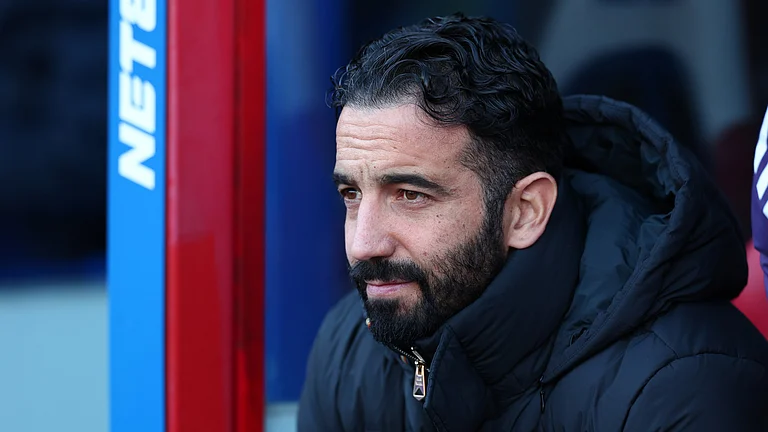In Mumbai, Shashi Tharoor, UN under-secretary for public affairs, dismissed the idea that Paul Volcker was a part of some conspiracy to serve US interests, and affirmed total faith in the integrity of the committee. But one does not need a conspiracy to further an interest. One may do it out of one's own free will. Paul Volcker's integrity is unimpeachable. But he is also an 83-year-old Republican who has been schooled by his entire life to believe in America's manifest destiny to spread freedom and democracy around the world. It is not surprising, therefore, that the final report of his committee has thrown George W. Bush a lifeline just when he needed it most. Bush had begun to face anti-war demonstrations in the US that were strongly reminiscent of the early phases of the anti-Vietnam war campaign. His job approval rating had slumped to a record low of 37 per cent, and the number of Americans dead in Iraq had crossed the psychological threshold of 2,000. Another 15,000 had been injured with half or more of them crippled for life.
The Volcker report has gone some way towards repairing the damage. It has shown beyond any doubt that Iraq did indeed use oil quota allocations to mobilise and consolidate political support against the sanctions, and that it obtained kickbacks from the buyers of oil and sellers of humanitarian goods to skim money off the top in violation of the UN sanctions. What it leaves unsaid is that from 1994, or 1995 at the latest, the sanctions were no longer morally justified because Iraq had grudgingly fulfilled its commitment to destroy its weapons of mass destruction.
What it also leaves unsaid is in that same year, the US violated its commitments under UNSC resolution 687 by announcing that it had no intention of allowing the sanctions to be lifted so long as Saddam Hussein remained in power.
The media studiously underplayed the significance of this declaration, and no UN member or official lodged a protest. What the report also leaves unsaid is that Iraq scrupulously abided by the terms of the oil-for-food resolution (No. 968) for 31 months and only began to violate it when it lost all hope that the sanctions would ever be lifted. The members of the Volcker committee can argue that passing value judgements upon the sanctions or guessing Iraq's motives was outside its terms of reference. But it felt no qualms about stepping outside its terms of reference when it came to destroying the reputation of people whom the US had earlier identified, in the final report of the Iraq Survey Group, and the Norman Coleman commission of the Senate, as friends of Iraq.
The first anomaly that Volcker records but chooses to ignore is that although the oil-for-food programme began in 1996, the first time Iraq levied after-sales and transportation charges on imports was in mid-1999, and the first time it levied a surcharge on oil exports was in autumn 2000. If Saddam wanted money to build palaces and WMD, then why did he wait so long? The answer clearly deducible from the report is that Iraq lived up to its commitment to deposit all oil revenues and pay for all humanitarian goods through the escrow account established for the programme so long as it retained a vestige of hope that the sanctions would be lifted. It did not lose hope in 1994 when President Bill Clinton announced that the sanctions would stay irrespective of whether Saddam destroyed his WMD so long as he remained in power. It did not lose hope when, under US prompting, UNSCOM kept raising the bar of compliance. It did not even give up hope on August 25, 1998, when the new UNSCOM chairman, Richard Butler, went back on assurances he had given to prime minister Tariq Aziz in Baghdad only 13 days earlier that he would give a favourable report to the Security Council upon his return. It gave up hope only when UNSCOM pulled its inspectors out of Iraq to permit the US and UK to start bombing Iraq "to degrade" a capacity to make WMD that, we now know, had ceased to exist four years earlier. Only then did Saddam's government start looking for an alternate source of funds.

It needed these funds not to build palaces but to perform the minimum functions of the State. The sanctions imposed under resolution 661 in 1990 were designed not merely to economically isolate Iraq but to bankrupt the State. Like all oil-rich countries, Iraq ran its free schools and universities and hospitals, and its water supply, sanitation and shelter systems, from its oil revenues. When those dried up, these services dried up too. One result was a huge rise in child mortality from 50 per thousand in 1990 to 125 per thousand in 1996. By the latter year, UNICEF estimated that half-a-million Iraqi children had met a needless death.
The oil-for-food programme was itself a response to the need to halt this silent genocide. But the UN secretariat soon realised that providing food and medicines was not enough. Iraq needed civil infrastructure; it needed to rebuild the milk plants and sewage and water treatment plants that the daily bombing was destroying. By the time of the invasion, Iraq was buying goods and services under no fewer than 24 categories of essential supplies.
But even these could not meet all the needs of the state. Firstly, the process of purchasing through the UN 661 committee was excruciatingly slow. Proof of this, which Volcker again chose to ignore, was that while Iraq sold $64.2 billion worth of oil till March 2003, it was allowed to purchase only $36.7 billion worth of goods. This amounted to a delay of nearly three years. Secondly, many of the goods and services that Iraq needed were not even then on the permitted import list. Lastly, Iraq had legitimate security concerns and needed to renew a bare minimum of its stock of weapons. This was conceded by the UN Security Council in its resolution 687 of April 3, 1991, which had also spelt out the weapons that Iraq was allowed to retain.
But it had been left with no financial means of purchasing what it needed. So during the first years under sanctions, Iraq printed money to keep the government going. But that caused the dinar to crash till it was worth virtually nothing. By 1998, it was in utter need of free foreign exchange to run the state.
The committee has felt none of the need to respect terms of reference and avoid the benefit of hindsight when it came to targeting individuals. On the contrary, it criticises the very resolution (968) whose implementation it was set up to study. "It was a basic assumption of the programme that Iraq—not the UN—would choose its oil buyers. Yet the decision to allow Iraq to choose its buyers empowered Iraq with economic and political leverage to advance its broader interest in overturning the sanctions regime." The UNSC did this out of respect for Iraq's sovereignty, which it affirmed repeatedly in resolution after resolution. But Volcker felt no such qualms.
If Iraq could choose its buyers, then it broke no law while soliciting or accepting contracts. Nor did it break any law while selling its quotas to oil companies and traders, and accepted two and three cents a barrel for the intermediacy. Only those who received the kickbacks that Iraq demanded in dollars and then deposited them in an Iraqi bank account actually broke the sanctions. Why then has Volcker devoted the bulk (239 out of his 630 pages) to naming, examining the bank accounts of, and impugning the motives of persons who had actually broken no law? Was it because, as the report takes the trouble to note about George Galloway in footnote 142 of chapter 2, "In parliamentary speeches Galloway argued that sanctions against Iraq were responsible for chronic malnutrition, disease and lack of adequate healthcare as well as the deaths of 6,000 children monthly... (described) UNSCOM as an American tool working with Israeli intelligence; (and) called Richard Butler... 'a congenital liar and provocateur'".
Every word of what Galloway said was subsequently endorsed by no less well-informed a person than Scott Ritter, formerly of US marine intelligence, and head of UNSCOM's anti-concealment division. But Volcker dismisses it as propaganda and a payback for Iraq's funding, through an intermediary, of Galloway's anti-sanctions charitable trust, Mariam Appeal, and for some £120,000 paid into the bank account of his Arab wife!
It does not mention that husband and wife may have been estranged then, for they are now on the way to divorce. Nor does the committee recognise the fact that Galloway began his campaign at least two years before Mariam Appeal received any money from the alleged intermediary.
The Volcker character assassination methodology is best revealed by the case of Jean Bernard Merimee, former French ambassador to India, permanent representative at the UN and special advisor to secretary-general Kofi Annan, who was arrested in Paris a few days ago. The Volcker report unambiguously implies that Merimee was granted oil allocations by Baghdad because as the French PR he had advocated the oil-for-food programme in 1995, and later stated that sanctions should be lifted once Iraq had fulfilled its obligations. Since both were part of his duties, one is at a loss to understand why this should have been highlighted as some out-of-turn recommendation. But that is only the beginning of the story.
Merimee received his first allocation of oil on August 4, 2001. That was three years after he retired from the French foreign service (not after he ceased to be France's ambassador to the UN as the committee inadvertently claims on page 58). Volcker indicts him on the ground that he was at that time a special advisor to the UN secretary-general, so this amounted to straightforward influence-buying by Iraq and corruption on the part of Merimee. But bits of information in the report that Volcker refuses to collate suggest a different story. Merimee approached the Iraqis for an oil allocation sometime after he retired from the foreign service when he was a private citizen, almost certainly because he knew the decision-makers. This is standard practice all over the world and the basis of the flourishing lobbying industry in Washington. He was granted one—probably orally—but deferred the allocation because in 1999 he was drafted by the secretary-general. The allocation was finally put down under his name on August 4, 2001. This was ten days before Merimee's contract with the UN expired. The actual deal almost certainly was struck well after he had left his post and was once more a private citizen. This does not morally exonerate Merimee completely but we are talking of the letter of the law, aren't we? If you open the Pandora's box of its spirit, then all UN members, including India, have been guilty of genocide in Iraq for over a decade.
Finally, only in the footnotes do we find that Merimee was advisor to the SG on European Affairs. He had nothing whatever to do with Iraq.






















